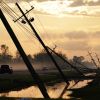-
 +14 +1
+14 +1Why our continued use of fossil fuels is creating a financial time bomb
The numbers are startling. We know roughly how much more carbon dioxide we can put into the atmosphere before we exceed our climate goals—limiting warming to 1.5° to 2° C above preindustrial temperatures. From that, we can figure out how much more fossil fuel we can burn before we emit that much carbon dioxide. But when you compare those numbers with our known fossil fuel reserves, things get jaw-dropping.
-
 +3 +1
+3 +1The Mastermind Episode 3: He Always Had a Dark Side
How did a Usenet troll and encryption genius become a criminal mastermind? For a man who built an empire in pixels, Paul Le Roux seemed like a digital phantom. After his name surfaced in the press in late 2014, I spent the better part of a year trying to understand him through the same means by which he’d directed his massive pharmacy business: the Internet. Late at night, I would open my laptop and plunge into an online wormhole, searching for clues about who Le Roux had been and what he became.
-
 +3 +1
+3 +1Could electric vehicles put an end to wars over oil?
Climate scientists have been clear that if we want to reduce carbon emissions and slow the pace of global warming, one crucial step is moving from a transportation system run on fossil fuels to one powered by electricity. But it's possible that doing so might neutralize other toxic aspects of the petroleum industry, such as volatile prices and armed conflict.
-
 +19 +3
+19 +3Forget Gas Prices. The Billionaire Club’s Run on Cobalt Says Everything About Our Battery-Powered Future
As the bankers from J.P. Morgan’s London offices stepped off the two-hour private flight from Johannesburg onto the hot runway, soldiers sporting sunglasses and semiautomatics watched them closely. The Democratic Republic of the Congo’s brutal civil war had ended several years earlier, but peace remained tenuous, and the Lubumbashi airstrip was still heavily militarized.
-
 +20 +4
+20 +4Is There Any Point to Protesting?
That winter of 2003—you remember it, and so do I—the world assembled, arms linked, to protest the prospect of war in Iraq. What times those were, and how the passions swelled. The fervor of the public reached a peak on February 15th, when millions of people in more than sixty countries claimed the streets, voicing their opposition. “listen to us,” a sign in London read. In New York, demonstrators stormed the avenues with a huge inflatable globe. Young and old turned out, and citizens and foreigners. A few weeks later, the United States was at war.
-
 +19 +4
+19 +4Storms batter aging power grid as climate disasters spread
Power outages from severe weather have doubled over the past two decades across the U.S., as a warming climate stirs more destructive storms that cripple broad segments of the nation’s aging electrical grid, according to an Associated Press analysis of government data.
-
 +18 +2
+18 +2How did Europe become the richest part of the world?
In a time of great powers and empires, just one region of the world experienced extraordinary economic growth. How?
-
 +20 +4
+20 +4Why you (probably) won’t finish reading this story
We live in a distracted world, almost certainly the most distracted world in human history. And if you’re part of this circus, you’re drowning in options and gadgets and screens and you’re being pulled in a million directions seemingly all at once.
-
 +10 +1
+10 +1The Rabbit Hole Beneath the Crypto Couple Is Endless
“I’m in shock,” said Cavier Coleman, a New York-based photographer and artist, the day after Heather Rhiannon Morgan was arrested. “She’s a great person.” The two had been friends for nearly five years; he remembered that she would bring him bags of pecans from her grandmother’s tree, and was passionate about making sure her friends were treating the coronavirus seriously.
-
 +4 +1
+4 +1Anarchists are Building DIY Heaters to Keep Unhoused People Warm
As temperatures fall sharply and the number of unhoused people swells throughout the United States, anarchists are forming a decentralized network that builds and distributes tent-safe, alcohol-based heaters to those without shelter.
-
 +14 +3
+14 +3They Were Reporters in Hong Kong. Now They Drive Cabs and Sell Fried Chicken.
The demise of the city’s independent news outlets has left hundreds of journalists out of a job. Many are not coming back.
-
 +13 +2
+13 +2Should animals, plants, and robots have the same rights as you?
Everyone reading this sentence likely (hopefully!) agrees that women deserve the same rights as men. But just a couple of centuries ago, that idea would’ve been dismissed as absurd.
-
 +15 +4
+15 +4How an Undercover Cop Having Sex With Activists Killed a Climate Movement
Mark Kennedy spent seven years pretending to be a climate activist. People he deceived are still rebuilding their lives.
-
 +23 +2
+23 +2After ALS struck, he became the world's most advanced cyborg
Scott-Morgan, who is 63, remains undaunted, though. “Paralysis is an engineering problem,” he insists, and it’s one he has a solution for: becoming a cyborg. “And when I say ‘cyborg,’ I don’t just mean any old cyborg, you understand, but by far the most advanced human cybernetic organism ever created in 13.8 billion years,” he says.
-
 +16 +3
+16 +3Who's Satoshi Nakamoto?
The year is 2050, Earth doesn't look like a blue dot from space. The scientists were correct. Climate change was real. Being correct and real were not sufficient motivators for humanity. Just like the frog in boiling water, humans were not able to understand what's happening. Maybe if some alien species from space warned us, it might have made a difference, because we ignored the species living alongside us for millions of years. They are all extinct now. We don’t have to invent fancy names for Pokemon anymore.
-
 +16 +5
+16 +5From Cyberpunk to Solarpunk: Technics and the Cities of the Future
Recently, I came across a paper by the great historian, and philosopher of technology, Lewis Mumford, titled ‘Authoritarian and Democratic Technics’ (ADT). Mumford, who was an expert on cities and architecture, publishing the monumental The City in History in 1961, had a unique insight into the way that technics operated in an urban environment. His essay is concerned with how technical systems, from ancient times to today, have the propensity to enable or resist authoritarianism.
-
 +21 +3
+21 +3At Least 100 House Members Are Invested in Fossil Fuels
In May, the International Energy Agency laid out an ultimatum to policy makers: for the world to have a 50/50 chance at reaching net-zero emissions by 2050, no new fossil fuel developments can be approved, starting immediately.
-
 +30 +6
+30 +6This legendary 92-year-old biologist has some advice for saving Earth
In the spring of 1955, E.O. Wilson, then a young entomologist at Harvard, traveled to northeastern Papua New Guinea to study ants. Hiking with local guides through dense rainforests, he climbed 13,000 feet to the summit ridge in the Saruwaged mountains — becoming, by his account, the first Western scientist to reach the peak.
-
 +16 +3
+16 +3Snowden Documents Reveal Covert Surveillance and Pressure Tactics Aimed at WikiLeaks and Its Supporters
Top-secret documents from the National Security Agency and its British counterpart reveal for the first time how the governments of the United States and the United Kingdom targeted WikiLeaks and other activist groups with tactics ranging from covert surveillance to prosecution.
-
 +2 +1
+2 +1Mary, Queen of Scots, sealed her final missive with an intricate spiral letterlock
On the eve of her execution for treason in February 1587, Mary, Queen of Scots, penned a letter to King Henri III of France and secured it with a paper lock that featured an intricate spiral mechanism. So-called "letterlocking" was a common practice to protect private letters from prying eyes, but this spiral lock is particularly ingenious and delicate because it incorporates a built-in self-destruct feature, according to a new paper published in the Electronic British Library Journal.
Submit a link
Start a discussion




















